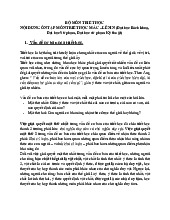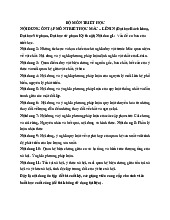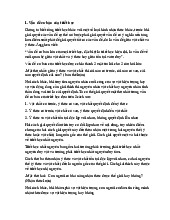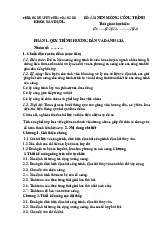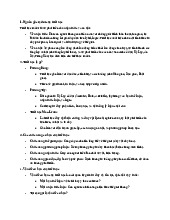




Preview text:
lOMoAR cPSD| 41487872 TEACHING AND LEARNING
Information Literacy Policy Policy Statement 1 Intent
The Information Literacy policy defines information literacy and aims to ensure that all
students in the University of Tasmania develop information literacy skills.
The Policy on Generic Attributes of Graduates at the University of Tasmania
requires all students to graduate with a set of generic attributes that include: • Knowledge
• Communication Skills
• Problem-solving skills • Global Perspective
• Social Responsibility
Information Literacy is required within problem-solving skills but also underpins
knowledge attributes and communication skills. 2 Scope
This policy applies to undergraduate and postgraduate students, academic teaching
staff, and general staff involved in supporting the development by students of generic attributes. 3 Objectives
All students at the University of Tasmania will be supported to develop information
literacy. The policy establishes a model for embedding information literacy into the
academic curriculum of the University, articulates the role and responsibilities of the
University’s key contributors to the development of information literate graduates, and
establishes consultative and reporting mechanisms for stakeholders. 4 Definitions Information literacy
Information literacy enables individuals to recognise when information is needed and
to locate, evaluate and use information effectively. It is a prerequisite for lifelong learning.
Information literate graduates of the University of Tasmania will be able to
• Recognise a need for information
• Determine the extent of information needed
• Access information efficiently
• Critically evaluate information and its sources
• Classify, store, manipulate and redraft information collected or generated lOMoAR cPSD| 41487872
• Incorporate selected information into their knowledge base
• Use information effectively to learn, create new knowledge, solve
problems and make decisions
• Understand economic, legal, social and cultural issues in the use of information
• Access and use information ethically and legally
• Use information and knowledge for participative citizenship and social responsibility
• Experience information literacy as part of independent learning and lifelong learning. 5 Policy Provisions Stakeholders
The development of information literate graduates is a shared responsibility. Key
partners in this enterprise are academic staff, the Flexible Education Unit, the
University Library, and students of the University of Tasmania. These partners
work together to embed information literacy programmes into the curriculum,
within the context of the graduate attributes policy.
While the Library has a leadership role in the development of information literate
graduates, the effective embedding of information literacy programmes within the
mainstream of the learning process requires close co-operation between all stakeholders.
Roles and responsibilities The University Library
Provides leadership in policy formulation and planning for
information literacy within the University.
Works with partners to monitor international and national trends in
information literacy training, and benchmark these against the
information literacy programmes of the University.
Advocates, to Teaching & Learning Committees and Heads of School, the
embedding of information literacy into the curriculum within the context of graduate attributes.
Works with the Flexible Education Unit to develop a sustainable training and
support model for academic staff, in the area of information literacy.
Works with academic staff to integrate information literacy objectives
into course curriculum and Unit outlines and content.
Develops, promotes and delivers information literacy training and support to
the academic and student communities.
Works with partners to evaluate the quality and effectiveness of the
information literacy programmes of the University. 2 lOMoAR cPSD| 41487872 The Flexible Education Unit
In partnership with the University Library, contributes to policy formulation
and planning for information literacy within the University.
Works with the University Library to develop a sustainable training and
support model for academic staff, in the area of information literacy.
Leads initiatives to assist students to map their acquisition of information
literacy skills, within the context of graduate attributes.
Associate Deans (Teaching & Learning) and Heads of School
Oversee the incorporation of information literacy skills into all University of
Tasmania courses/programs as a component of graduate attributes.
Promote the inclusion of information literacy objectives into relevant
course curriculum and Unit outlines, in the context of graduate attributes.
Report to Teaching & Learning Committees, through the mechanism of
the Annual Course Reports, on how their programmes develop information
literacy skills within the context of graduate attributes. Academic staff
Work with the University Library and the Flexible Education Unit to
develop information literacy programmes that are relevant to course curriculum and Unit outcomes.
Where appropriate, incorporate information literacy objectives into
Unit outlines, in the context of graduate attributes. Students
Monitor and record their development of information literacy skills, as
a component of mapping their development of graduate attributes. lOMoAR cPSD| 41487872 6
Supporting/Related Documents
Australian and New Zealand Information Literacy Framework
http://www.anziil.org/resources/Info lit 2nd edition.pdf
Policy on the Generic Attributes of Graduates
http://www.admin.utas.edu.au/HANDBOOKS/UTASHANDBOOKS/RULES/POLGE N.html
See Appendix 1 for details of supporting documents Responsibilities Implementation
Pro Vice-Chancellor, Teaching and Learning Compliance
Associate Deans (Teaching & Learning) Heads of School Academic teaching staff Liaison Librarians
Learning Development team, FEU
Monitoring and Evaluation University Librarian
Development and/or Review University Librarian
Interpretation and Advice University Librarian
Who Needs to Know this Policy?
• Associate Deans (Teaching & Learning) • Heads of School
• Academic teaching staff • Liaison Librarians
• Learning Development staff, FEU.
Effectiveness of this Policy
The effectiveness of this policy will be measured by
• The development by the University Library and the Flexible Education Unit of a
sustainable model for supporting academic staff in the development of information literate graduates.
• The inclusion of information literacy objectives into course curriculum and
relevant Unit outlines, under the umbrella of the ‘graduate attributes’ heading.
• Academic staff and Liaison Librarians working together to develop
information literacy training programs, to support teaching and learning.
• Faculty Teaching & Learning Committees including statements on information literacy
initiatives into Annual Course Reports. 4 lOMoAR cPSD| 41487872
Appendix 1. Details of Supporting Documents
Australian and New Zealand Information Literacy Framework
http://www.anziil.org/resources/Info lit 2nd edition.pdf
The Australian and New Zealand Information Literacy Framework has been
developed for use in the higher education sector, for endorsement and promulgation by
policy makers, educational institutions, and professional and educational associations.
It outlines six information literacy standards, with corresponding outcomes and
exemplars for the information literate person. These mesh closely with, and expand
upon, information literacy exemplars used in the University of Tasmania ‘Policy on
the Generic Attributes of Graduates’.
ILS 1. The information literate person recognises the need for information
and determines the nature and extent of the information needed.
ILS 2. The information literate person accesses needed information effectively and efficiently.
ILS 3. The information literate person critically evaluates information and
the information seeking process.
ILS 4. The information literate person manages information collected or generated.
ILS 5. The information literate person applies prior and new information to
construct new concepts or create new understandings.
ILS 6. The information literate person uses information with understanding and
acknowledges cultural, ethical, economic, legal, and social issues surrounding the use of information.
Policy on the Generic Attributes of Graduates
http://www.admin.utas.edu.au/HANDBOOKS/UTASHANDBOOKS/RULES/POLGE N.html
In the University of Tasmania’s Policy on the Generic Attributes of Graduates the
skills comprising ‘information literacy’ are used as exemplars in the generic attributes
of ‘knowledge’, communication skills’, and problem-solving skills’. Attribute: Knowledge Exemplar:
Apply technical and information skills appropriate to their discipline or professional area Attribute: Communication skills Exemplar:
Access, organise and present information, particularly through technology based activity Attribute: Problem-solving skills Exemplar:
Find, acquire, evaluate, manage and use relevant information in a range of media 5
